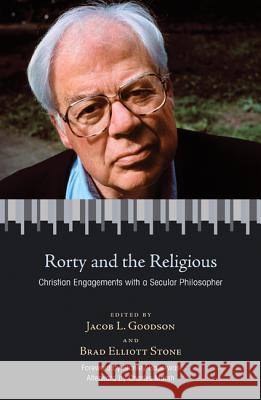Rorty and the Religious: Christian Engagements with a Secular Philosopher » książka
Rorty and the Religious: Christian Engagements with a Secular Philosopher
ISBN-13: 9781610974288 / Angielski / Miękka / 2012 / 250 str.
Rorty and the Religious: Christian Engagements with a Secular Philosopher
ISBN-13: 9781610974288 / Angielski / Miękka / 2012 / 250 str.
(netto: 116,25 VAT: 5%)
Najniższa cena z 30 dni: 116,20
ok. 16-18 dni roboczych.
Darmowa dostawa!
Synopsis: Prior to his death in 2007, the self-described secular philosopher Richard Rorty began to modify his previous position concerning religion. Moving from "atheism" to "anti-clericalism," Rorty challenges the metaphysical assumptions that lend justification to abuses of power in the name of religion. Instead of dismissing and ignoring Rorty's challenge, the essays in this volume seek to enter into meaningful conversation with Rorty's thought and engage his criticisms in a constructive and serious way. In so doing, one finds promising nuggets within Rorty's thought for addressing particular questions within Christianity. The essays in this volume offer charitable yet fully confessional engagements with an impressive secular thinker. Endorsements: "Jacob Goodson and Brad Stone have brought together a fair sampling of contemporary thinkers . . . The three sections of Rorty and the Religious take on the status of Christianity in analytic philosophy, the implications of Rorty's thought for Christian moral understanding, and the prospects for social hope. This book . . . brings together the intellectual life, as exemplified by Rorty, and the 'sustained practice' informed by 'spiritual nourishment and the hope of the risen Christ.'" --G. Scott Davis, University of Richmond "Goodson and Stone's spirited gathering of Christian thinkers shows us not only why, but how Rorty's pragmatism needs an account of religion to ground its vision of hope and love. It shows] why and how contemporary Christian theology needs a chastened pragmatism to bring its imaginings back down to earth. Here is an engaging philosophy and a critically minded theology, a reason for hope. --Peter Ochs, University of Virginia "Goodson and Stone have brought together an excellent group of religious thinkers who take seriously the invitation to start a new conversation with a secular, though not antireligious, thinker, one who recognized the power of telling and retelling in our private lives, but also in the generation of civic solidarity. By doing so, they have enriched and expanded our understanding of Rorty's thought and of our religious America." --Eduardo Mendieta, Stony Brook University Author Biography: Jacob L. Goodson (PhD, University of Virginia) is Visiting Professor of Religious Ethics in the Department of Religious Studies at the College of William & Mary. He has published scholarly essays in The American Journal of Theology and Philosophy and Contemporary Pragmatism. Brad Elliott Stone is Associate Professor of Philosophy and Director of the University Honors Program at Loyola Marymount University. He has published several essays and book chapters in pragmatism, continental philosophy, and Spanish philosophy.
Synopsis:Prior to his death in 2007, the self-described secular philosopher Richard Rorty began to modify his previous position concerning religion. Moving from "atheism" to "anti-clericalism," Rorty challenges the metaphysical assumptions that lend justification to abuses of power in the name of religion. Instead of dismissing and ignoring Rortys challenge, the essays in this volume seek to enter into meaningful conversation with Rortys thought and engage his criticisms in a constructive and serious way. In so doing, one finds promising nuggets within Rortys thought for addressing particular questions within Christianity. The essays in this volume offer charitable yet fully confessional engagements with an impressive secular thinker.Endorsements:"Jacob Goodson and Brad Stone have brought together a fair sampling of contemporary thinkers . . . The three sections of Rorty and the Religious take on the status of Christianity in analytic philosophy, the implications of Rortys thought for Christian moral understanding, and the prospects for social hope. This book . . . brings together the intellectual life, as exemplified by Rorty, and the sustained practice informed by spiritual nourishment and the hope of the risen Christ."--G. Scott Davis, University of Richmond"Goodson and Stones spirited gathering of Christian thinkers shows us not only why, but how Rortys pragmatism needs an account of religion to ground its vision of hope and love. [It shows] why and how contemporary Christian theology needs a chastened pragmatism to bring its imaginings back down to earth. Here is an engaging philosophy and a critically minded theology, a reason for hope.--Peter Ochs, University of Virginia"Goodson and Stone have brought together an excellent group of religious thinkers who take seriously the invitation to start a new conversation with a secular, though not antireligious, thinker, one who recognized the power of telling and retelling in our private lives, but also in the generation of civic solidarity. By doing so, they have enriched and expanded our understanding of Rortys thought and of our religious America."--Eduardo Mendieta, Stony Brook UniversityAuthor Biography:Jacob L. Goodson (PhD, University of Virginia) is Visiting Professor of Religious Ethics in the Department of Religious Studies at the College of William & Mary. He has published scholarly essays in The American Journal of Theology and Philosophy and Contemporary Pragmatism.Brad Elliott Stone is Associate Professor of Philosophy and Director of the University Honors Program at Loyola Marymount University. He has published several essays and book chapters in pragmatism, continental philosophy, and Spanish philosophy.











